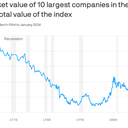The S&P 500’s top stocks haven’t been this concentrated in 50 years

Giant companies now dominate the stock market in a way we haven't seen in 50 years.
Why it matters: It's the financial representation of how the largest firms — most of all, the giant tech companies known in the stock market as "the Magnificent Seven" — increasingly stand astride corporate America and the broader economy as colossi.
The latest: Shares of Facebook's parent company, Meta, soared more than 20% on Friday after it reported that its Q4 profit tripled versus last year, and announced its first-ever dividend and another $50 billion in planned buybacks.
- The one-day surge created some $200 billion in market value.
- For context, the entire market value of McDonald's Corp is about $220 billion.
Catch up fast: The Magnificent Seven are Apple, Microsoft, Alphabet, Amazon, Nvidia, Tesla, and Meta.
- The ranks of the top 10 include Berkshire Hathaway, Eli Lilly and chipmaker Broadcom.
- As these companies have surged, they've become responsible for an increasing share of the stock market's performance.
By the numbers: Through Friday, the Magnificent Seven alone have been responsible for more than 40% of the stock market's gain since the start of the year, according to data from S&P Dow Jones Indices, the owner of the S&P 500.
- The S&P is up 4% in 2024.
Between the lines: Some see a risk in an increasingly top-heavy market.
- "Market leadership is becoming increasingly unhealthy with a further increase in stock concentration this January versus last year," wrote stock analysts with JPMorgan in a recent research report.
The other side: Some analysts argue that concentration, per se, shouldn't alarm investors.
- They point out that bull markets — we're officially in one — are often driven by a select group of hot stocks. (The S&P is up 39% since the bull began in October 2022.)
- The so-called Nifty Fifty, were a group of sizzling stocks — including Polaroid, Sears and Eastman-Kodak — that drove the bull market of the late 1960s and early 1970s.
- The "Four Horsemen" — Microsoft, Cisco, Oracle and Intel — led the market higher during the tech boom of the late 1990s.
💭 Matt's thought bubble: The size and dominance of these firms could pose a greater challenge for parts of the real economy than they do for the market.
- I couldn't help but notice the juxtaposition of the giant quarterly advertising revenues reported by Meta ($39 billion) and Google parent Alphabet ($66 billion) over the last week, against the backdrop of job cuts at advertising-dependent institutions like the Washington Post, the Wall Street Journal and the Los Angeles Times, as well as upstarts like the Messenger.
- A couple of years back, media investment analysis firm Ebiquity reported that Amazon, Alphabet and Meta — three companies — took $7 out of every $10 spent on global online advertising in 2021.
The bottom line: Looking at these share prices, I have to think that's higher now.